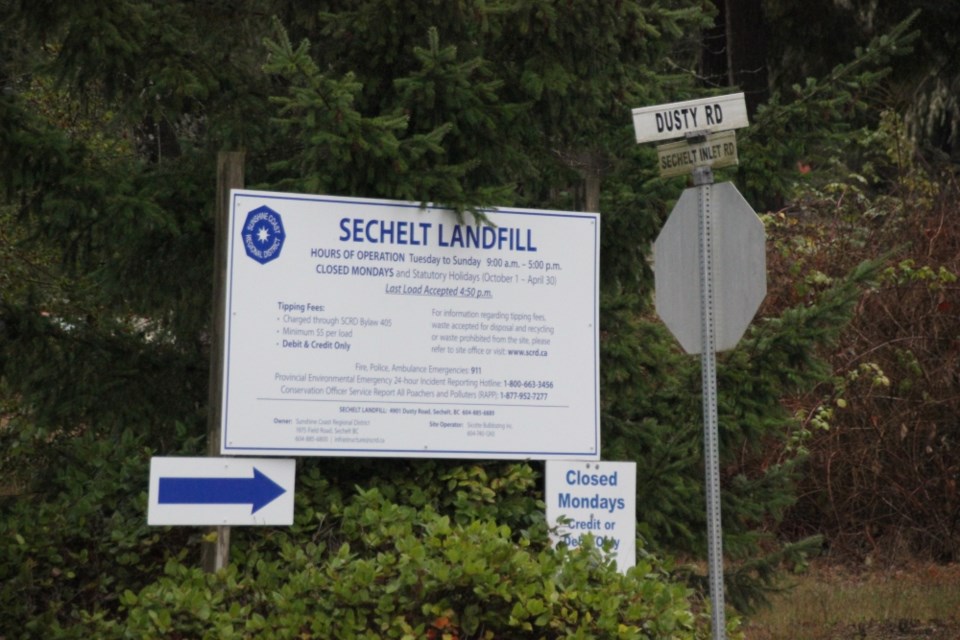When mayor John Henderson presented his idea to drill a well at Dusty Road within six months, Sechelt council defeated a motion and withdrew another before leaving the proposal to fund another study in the hands of the Sunshine Coast Regional District.
Henderson presented to Sechelt council in an evening meeting of Jan. 25, followed by a presentation to the SCRD board the next day. The regional directors declined to pay the estimated $50,000 to survey the Dusty Road site again.
At the Sechelt meeting prior to that decision, Henderson put forward a motion that the District of Sechelt provide funding to confirm the water quality at the Dusty Road well site to a maximum of $50,000 from general surplus and that the district start negotiation with the SCRD to take over the project. That motion was defeated with only Coun. Darren Inkster and Henderson in favour. Although Coun. Adam Shepherd introduced a motion that Sechelt’s representatives on the SCRD ask for further funds for testing at Dusty Road, it was withdrawn after it was pointed out that Henderson was already scheduled to give the same presentation to the SCRD the next day.
Although Inkster commented that he wanted to give the idea some life (but didn't like the funding source), councillors discussed Sechelt's versus the SCRD's role in taking on a water project.
The Jan. 25 council meeting was the first opportunity councillors had to comment on Henderson’s Dusty Road pitch publicly. The mayor’s presentation also included an estimated cost of $25,000 to $50,000 to retest the site’s water quality and capacity, and around $350,000 for construction work. He suggested an expedited RFP process. The timeline he included said water would be available as of July 1, 2023.
Inkster pointed out the cost provided by Henderson comes in at 3.5 per cent of the cost to build the Church Road wellfield project. Coun Brenda Rowe asked the mayor whether the quote of $25,000 to $50,000 came from staff. He said it came from a “qualified, independent professional in the industry,” but did not name who.
Later in the meeting, coun. Alton Toth said he wants more transparency. He said that he had declined invitations to meet with experts privately, “because this is not a conversation that we should be having in backrooms and coffee shops. This is work that needs to be supported by the experts that actually are legally responsible for the safe delivery of drinking water and those experts advise that Dusty Road is not a prudent course of action.”
Shepherd said, “My first concern looking at the plan is not the budget, it’s health. I don't see any mention of government regulation here.” He asked council to consider another approach and noted more water summits that include all of the local governments are coming up.
Henderson replied that short-term licences are administered differently and are for two years.
Councillors Brenda Rowe and Alton Toth expressed doubt that such a project could meet a proposed timeline of six months. Toth said, “I just don’t see us legally getting approvals for this project in a timely manner.” Later in the discussion, Rowe said, “I can’t imagine a world where that timeline is realistic.”
Rowe also said she is not in support of anything that involved no approvals, pointing to the language Henderson used in a statement of his personal views that said, “We don’t need studies, we don’t need surveys, we don’t need approvals. We need water and we need it now.”
“Studies provide the evidence that we need to make decisions,” Rowe said, adding that Sechelt can’t do this without the province or shared decision-making with First Nations.
Coun. Donna Bell said she is not prepared to move forward without knowing the risks, while Coun. Dianne McLauchlan said she does not support a Dusty Road well nor a Water Supply Solutions Team. McLauchlan reiterated that she does not support new development (and adding demand on the water supply is “illogical”), and that the community should live within the limit and enhance water conservation efforts.
As for risk, Henderson said it is not a one-sided risk, as there’s also the risks associated with stages of water restrictions such as impacts on businesses, residents, farming and the community’s reputation.


